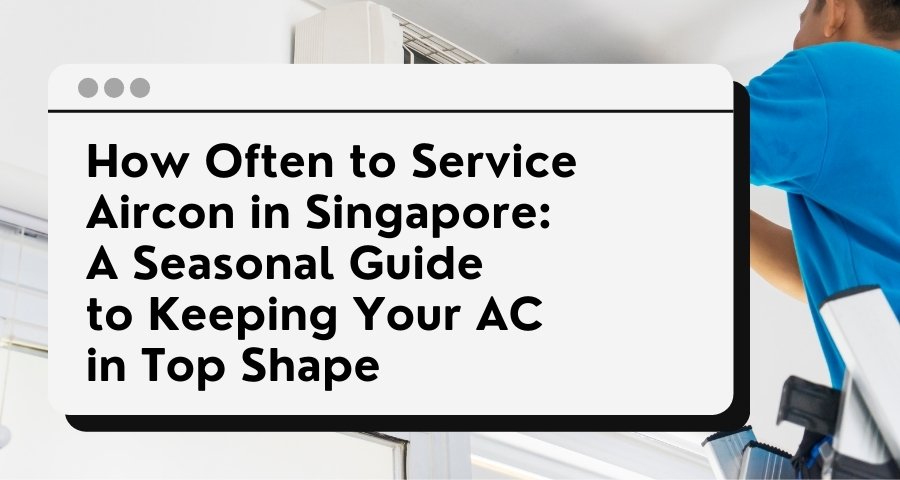Air conditioners are essential in Singapore’s hot and humid climate, running almost daily in homes and offices. However, many homeowners and businesses overlook regular maintenance, which can lead to poor cooling efficiency, higher electricity bills, and even costly repairs. With Singapore’s tropical weather, knowing the best times for aircon maintenance is crucial. If you’re wondering how often to service aircon in Singapore to ensure optimal performance throughout the year, read on.
Why Regular Aircon Servicing Matters
Routine aircon servicing is not just about preventing breakdowns—it directly affects your unit’s efficiency, air quality, and lifespan. Neglecting regular maintenance can result in:
- Reduced cooling efficiency – Dust buildup in filters and coils restricts airflow, making the unit work harder.
- Higher energy consumption – An unmaintained aircon consumes more electricity, increasing utility bills.
- Frequent malfunctions – Clogged filters, leaking refrigerant, and dirty evaporator coils can lead to costly repairs.
- Poor indoor air quality – Accumulated dust, mould, and bacteria in the unit can circulate in the air, triggering allergies or respiratory issues.
By servicing your aircon at the right intervals, you ensure it runs smoothly all year round while avoiding expensive emergency repairs.
Seasonal Guide to Aircon Servicing in Singapore
Since air conditioners run constantly in Singapore’s climate, following a seasonal maintenance schedule can help keep your unit in optimal condition.
1. Pre-Summer Maintenance (March – May)
Singapore experiences its hottest months between March and May, with temperatures often exceeding 35°C. During this period, air conditioners work overtime to maintain indoor comfort.
Recommended Maintenance:
- General servicing – Clean or replace air filters to remove dust and allergens.
- Check refrigerant levels – Low refrigerant can reduce cooling performance.
- Inspect for leaks – High usage can strain components, leading to potential leaks.
- Test the thermostat – Ensure temperature control is functioning correctly.
Why it matters: Servicing before peak heat months ensures your aircon performs efficiently and prevents sudden failures when you need it most.
2. Mid-Year Check-Up (June – August)
Even though these months are still warm, temperatures tend to stabilise slightly. However, humidity remains high, which can lead to condensation issues and mould growth within aircon units.
Recommended Maintenance:
- Evaporator and condenser coil cleaning – Remove dirt buildup that reduces efficiency.
- Check drainage pipes – Clogged pipes can cause water leaks.
- Inspect for mould or bacteria growth – Prolonged humidity encourages bacterial buildup.
Why it matters: Preventing mould and bacterial growth ensures better indoor air quality while keeping cooling performance at its peak.
3. Pre-Monsoon Servicing (September – November)
Singapore’s monsoon season begins around November, bringing cooler temperatures but also increased humidity and rainfall. While air conditioners may be used slightly less, moisture can still accumulate, affecting components.
Recommended Maintenance:
- Deep cleaning of internal components – This includes fan blades and blower wheels to remove accumulated dust.
- Inspect insulation and seals – Ensure no air leaks are affecting efficiency.
- Schedule an aircon chemical wash – This is ideal for units that haven’t been serviced in a long time, as it removes stubborn dirt and mould buildup.
Why it matters: Preparing your aircon before the wet season helps prevent efficiency loss due to excess moisture and potential damage from prolonged inactivity.
4. End-of-Year Tune-Up (December – February)
While Singapore does not have a winter season, December to February tend to be cooler months when aircon usage slightly decreases. This is an ideal time for more intensive maintenance.
Recommended Maintenance:
- Full system inspection – Ensure all components are functioning optimally.
- Check fan motors and belts – Wear and tear can affect airflow.
- Assess energy efficiency – Identify any issues that may be increasing electricity usage.
- Evaluate the need for upgrades – If your aircon is over 10 years old, consider replacing it with a more energy-efficient model.
Why it matters: An end-of-year servicing ensures that your aircon is in top condition for the upcoming year, reducing the risk of unexpected failures.
How Often Should You Service Your Aircon?
Aside from following a seasonal maintenance schedule, here’s a general rule of thumb for how frequently your aircon should be serviced based on usage:
- Residential Aircons:
- Light use (once a week): Servicing every 6 months
- Moderate use (daily for a few hours): Servicing every 3 to 4 months
- Heavy use (running all day, every day): Servicing every 1 to 2 months
- Office & Commercial Aircons:
- Standard office use: Servicing every 1 to 2 months
- High-traffic environments (e.g., retail stores, server rooms): Servicing monthly
For units that have not been serviced in over 6 months, a deep clean may be necessary to restore cooling performance and prevent major breakdowns.
Common Signs Your Aircon Needs Immediate Servicing
Even if you follow a seasonal schedule, there are warning signs that indicate your aircon needs immediate servicing:
- Weak airflow – This could mean clogged filters or blocked ducts.
- Strange odours – A musty or burning smell suggests mould growth or electrical issues.
- Unusual noises – Rattling, buzzing, or clicking sounds may indicate loose or damaged parts.
- Frequent cycling – If your aircon turns on and off frequently, it could be struggling to maintain temperature.
- Higher electricity bills – A sudden spike in energy costs often means your aircon is working harder than it should.
If you notice any of these issues, prompt maintenance can prevent further damage and reduce costly repairs. Neglecting servicing can also lead to the need for expensive deep cleaning solutions, as discussed in expert guides on when aircon deep cleaning is necessary.
Final Thoughts: Stay Proactive with Regular Aircon Servicing
Understanding how often to service your aircon is key to ensuring your unit runs efficiently throughout the year. By following a seasonal servicing schedule, you can extend your aircon’s lifespan, reduce energy costs, and prevent inconvenient breakdowns. Staying proactive with aircon care will keep your cooling system performing at its best, regardless of the season.

